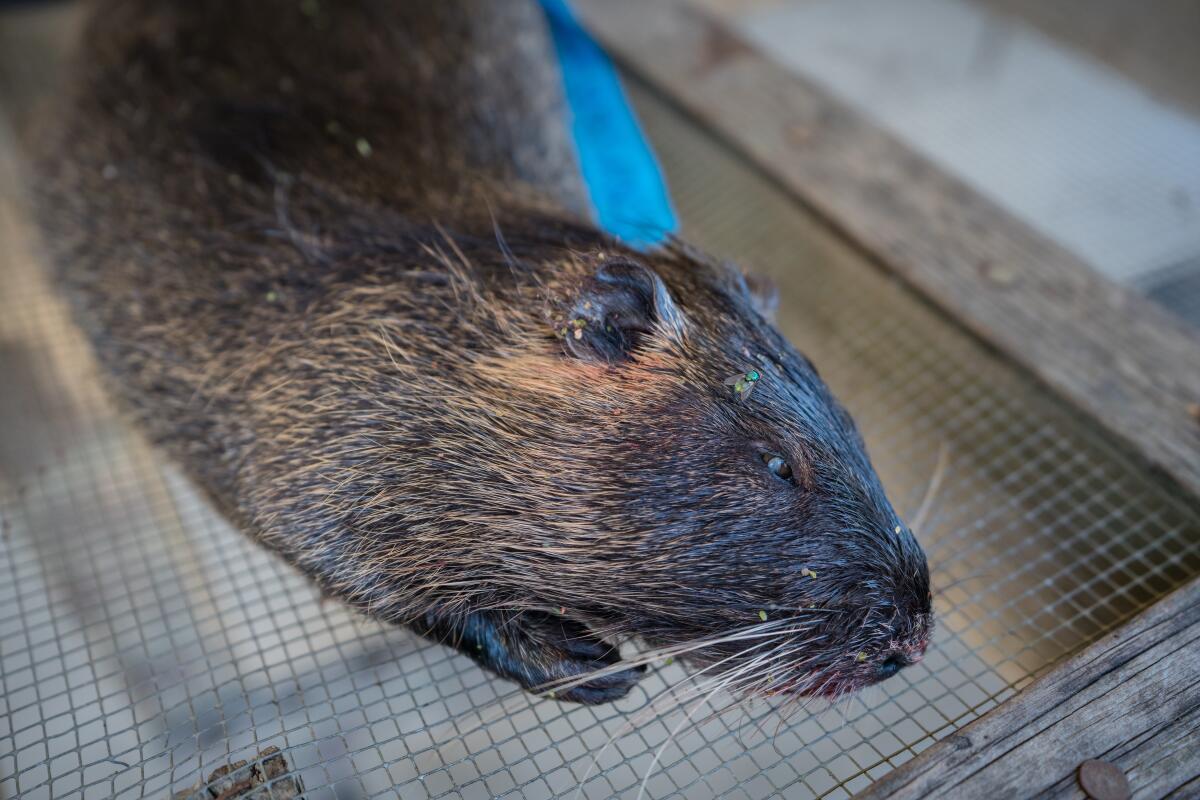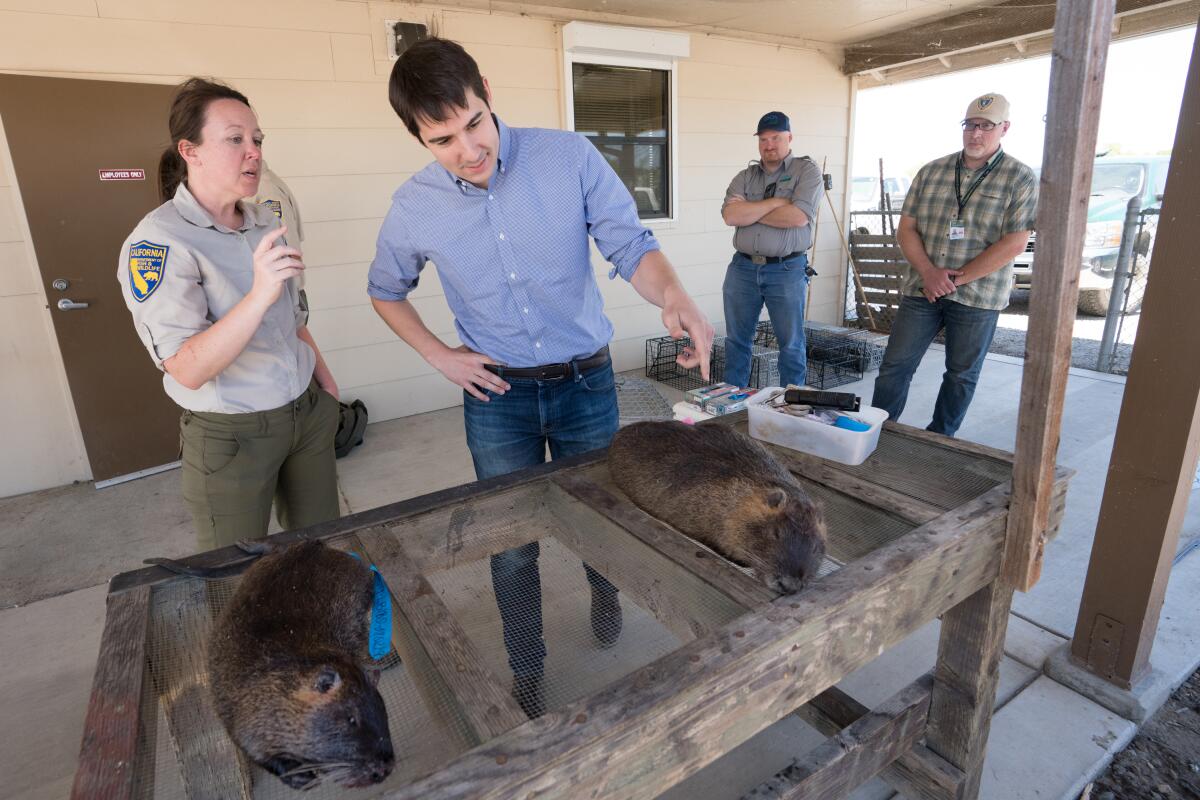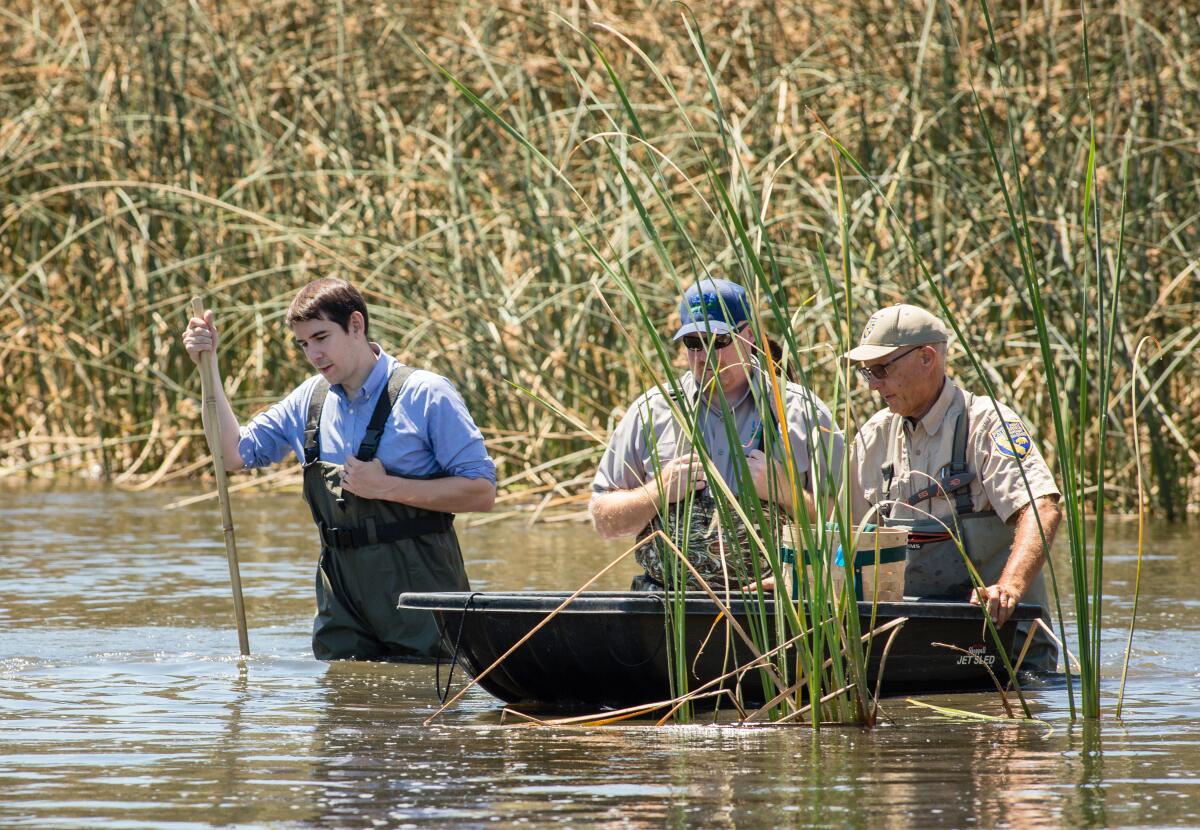Swamp rats have invaded California. A Central Valley Democrat is declaring war

- Share via
LOS BANOS, Calif. — Rep. Josh Harder’s opponents have called him a “shady venture capitalist” and “rabid socialist extremist” who only cares about “big donors and socialist Democrats in San Francisco.”
But last weekend, dressed in shirtsleeves and rubber waders, the freshman Democratic congressman from Turlock tried to buck that image. Harder sloshed through waist-deep muddy water in 90-degree heat as he accompanied state wildlife officials to check animal traps for signs of nutria. The invasive swamp rat has taken up residence in his Central Valley congressional district, threatening to damage levees, disrupt the state’s water supply and knock the Sacramento-San Joaquin River Delta ecosystem out of balance.
“Trap One is empty!” Harder called out after watching one of his tour guides fiddle with a small metal cage.
With the August congressional recess in full swing, Harder and other vulnerable California freshmen are back in their districts highlighting local issues that they hope will help them court their constituents and avoid partisan bickering in Washington. Rep. Katie Hill (D-Agua Dulce) helped pass additional funding for wildfire prevention efforts and Rep. Mike Levin (D-San Juan Capistrano) held a field hearing on the shuttered San Onofre nuclear plant and what to do about its waste.
For his part, Harder has focused much of his first year in office on local issues such as water storage and the effects of almond tariffs on Central Valley farmers. Now he is training his attention on the nutria, a semi-aquatic rodent that has drawn the ire of environmentalists, farmers and local officials alike.

Somewhere between the size of a sewer rat and a beaver, with a tail resembling that of an opossum and protruding, nacho cheese-colored teeth, the nutria is both impressively unattractive and highly destructive. Originally bred for a fur trade that collapsed in the 1940s, feral nutria populations have since spread to at least 16 states including California, which declared the rodent eradicated in the 1970s.
In places including Louisiana and Maryland’s Chesapeake Bay, nutria have burrowed through levees, destroyed crops and transformed vast swaths of vibrant wetlands into mud flats and open water. They are prolific breeders: Females have up to three litters a year, and can mate within 48 hours of giving birth.
California’s latest infestation was discovered in early 2017. State and federal agencies have warned that explosive population growth combined with California’s reliance on expansive waterways connected to the Sacramento-San Joaquin River Delta make the state especially vulnerable.
The brain center for California’s fledgling nutria eradication program is a rural Los Banos outpost of the California Department of Fish and Wildlife. Inside is a “war room” papered with maps of the Central Valley and watercolor paintings of the rodent, gifted by one employee’s wife.
On a visit to the facility Friday, Harder studied the maps, which are dotted with tiny pink stickers indicating confirmed nutria sightings — there have been nearly 700 caught in the state.
“If we don’t eradicate in five years, 10 years, this is going to be overrun by nutria, right?” the congressman asked.
Program manager Valerie Cook nodded. Failure to get rid of them, she added, could mean devastated wetlands, interrupted flight paths for migratory birds and weakened infrastructure crucial to agriculture and flood control.
“This is really like the trifecta of damage even far beyond what’s felt within the other states,” Cook said.
Louisiana pays hunters $6 a nutria tail to keep the population under control, with no hope of permanently removing the rodents. The Chesapeake Bay project, which is nearing eradication stages, is going on 20 years, with crucial funding coming from federal coffers.
Recently approved funds in California’s budget and a grant from the state Delta Conservancy will help officials here get up and running, allowing them to stop seeking assistance from state wildlife employees who are working on other crucial tasks. But the money runs out in three years.

“If there’s anything I want to stress today, it’s how critical it is to have that long-term support,” Cook said.
Harder has introduced a bill in Congress that would provide $7 million in funding a year for six years to help California detect, trap and kill nutria before they can irreversibly entrench themselves.
The funds would help state officials expand project staff to 16, run a second field office in Stockton and move forward with plans to acquire and train nutria-sniffing dogs and implement a “Judas nutria” program in which live animals are sterilized and released into the wild with tracking collars to help them pinpoint other colonies.
“If you care about the food that we eat, and you care about going to the supermarket and buying almonds or buying milk, then you need to care about what we can do to make sure that agriculture in California continues to be strong and that requires us to actually eradicate nutria,” Harder said after his wetlands tour.
It’s unclear whether Harder’s bill will earn passage. So far three Democrats from California have signed on as co-sponsors: Reps. John Garamendi (D-Walnut Grove), Jim Costa (D-Fresno) and fellow freshman TJ Cox (D-Fresno).
Some locals said it meant a lot to them that Harder is out in the community learning more about the issue.
“Just talking to farmers in general about what can be done to help the community and help California, just making his presence known it’s important,” said Aaron Silva, a sweet potato farmer whose family farm, Doreva Produce, has donated thousands of pounds of sweet potatoes to be used as nutria bait.
Silva says he doesn’t like to get involved in politics. But he says he appreciates any politician who takes an interest in addressing issues that business owners face.
“It always seems like California is against the farmer and all the problems we’re facing,” said Silva, who is not registered with a political party. “This is a positive process.”
More to Read
Sign up for Essential California
The most important California stories and recommendations in your inbox every morning.
You may occasionally receive promotional content from the Los Angeles Times.














